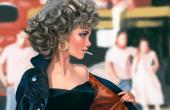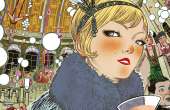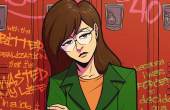Sam
Contributing writer for The Artifice.
Correspondent III
- Plebian Penman
- Common Writer
- Aristocratic Author
- Lurker
- Pssst
- Hand Raiser
- Vocal
- Outspoken
- Extrovert
- Sharp-Eyed Citizen
- Town Watch
- Detective Deskman
- Penman Patrol
- Forensic Fiend
- Well Read
- Chaptered Mind
- Article of the Month
- ?
- Articles
13 - Featured
13 - Comments
296
- Ext. Comments
127 - Processed
141 - Revisions
137
- Topics
26 - Topics Taken
8 - Notes
34
- Topics Proc.
263 - Topics Rev.
139
- Points
6287 - Rank
11 - Score
4471
Latest Articles
Latest Topics
Literature as an 'empathy machine'?The phrase 'empathy machine' was first used to describe the way that watching films can give the viewer an understanding of what it is like to be someone different (different age, gender, nationality, etc.). More recently, it has been used in reference to virtual reality technologies and their ability to allow users to 'embody' someone else. The claims of both of these mediums as empathy machines rests upon their alleged ability to allow the viewer/player to understand and feel what others feel. This empathy is, of course, something they cannot get from their own life as they do not have the same shared experiences that the machine is allowing them to have. Thus, these tools as empathy machines are profound. But, to what extent can literature be seen as a so-called empathy machine? Using a selection of texts, discuss how they can provide the reader with the knowledge necessary to empathise with those depicted in the texts. This could include fiction, where the reader is learning about the life of someone unreal. Or, it could be non-fiction, where the reader is learning of the life of a real person. Ensure that the specific empathetic qualities of literature are discussed. This might include literature's reliance on imagination, or the way that written texts allow for lengthy and in-depth first-hand accounts. The potential writer of this topic could provide an overall assessment; is literature more or less effective than film or V.R. in creating empathy? Why/why not?
|
The Portrayal of Catfishing Within Popular MediaThe act of catfishing — pretending to be someone else online to lure someone into a false relationship — has become a somewhat common occurrence. This also means that this behaviour has started appearing in more entertainment media. This, then, begs the question. How is the act of catfishing portrayed in media? An analysis of this topic could start with the TV show Catfish, which depicts the act as cruel whilst simultaneously often showing sympathy to those who participate in catfishing depending upon their individual circumstances. Through looking at other examples — either fictional or non-fictional — try to determine whether popular culture depicts this as a severe violation, a minor problem, or somewhere in between. If possible, make a comment about what this says about societal values. Note: I have placed this in the Arts category, but it could potentially sit in the other media forms (like TV or Film) if they are most discussed.
|
Fragmented Literature: What Does It Achieve?Modernist texts are often heavily fragmented – the plot is jumbled and does not follow a simple beginning to end chronology. This can be off-putting for many readers as it can make a story hard to follow and less immersive. However, what are the benefits and what does writing in fragments achieve? An article could look at a selection of texts that are fragmented and offer an analysis of what this particular structure is doing. For example, in Kaddish for an Unborn Child by Imre Kertesz, the plot keeps circling back to the same line, its repetition representing the repetitive trauma it has caused the protagonist. Or, in The Corpse Washer by Sinan Antoon, the plot is broken up by page long chapters detailing the nightmares had by the protagonist which can show how they interject in his life just as they have interjected into the plot.
|
Job Precariousness in SitcomsIn many sitcoms, characters often suffer the consequences of job precariousness. This includes being underpaid, taking jobs they hate, or losing their jobs altogether. An article looking at how these scenarios play out in T.V. could be an insightful read. Are they accurate depictions of real life, or do they diminish the real-world anxiety of this aspect of life? Is it enough to simply allude to homelessness or not being able to make rent, or should a show force its characters to endure this? You could offer a comparison of shows that do this well and shows that, perhaps, do not do this so well. You could offer an assessment regarding the impact this has on viewers, and contextualise the shows within both their setting and time of release.
|
Sitcoms: Live Audience Laughter Vs. Laugh TrackFor many sitcoms, including applause and laughter after every punchline is something of a staple. Laugh tracks, or 'canned laughter,' have been used in comedic television programmes for decades. However, many shows are also filmed in front of a live studio audience to produce the same effect.
|
What is the difference between Bildungsroman and Coming-of-Age?The word Bildungsroman is often used interchangeably with the term coming-of-age when describing growth-oriented literature. However, they are not necessarily the same. A Bildungsroman text is one that focuses on the psychological growth of a character. It follows said character from youth to adulthood, especially as they find themselves in difficult situations. Coming-of-age, however, is more of a broad umbrella term for any story about growing up. Through using one or more Bildungsroman and coming-of-age texts, the writer of this article could explore this difference. Some points to consider are the way a Bildungsroman is structured in four sections (loss, journey, conflict/growth, and maturity). Also, the way a Bildungsroman focuses on the entirety of youth, not just a small portion of it. Conversely, the coming of age text chosen should be used to show the ways that it is different from a Bildungsroman (such as, for example, focusing on only a month or year of youth). An article explaining these differences, with examples, could be an informative and educational read.
|
What Makes a Good Bottle Episode?A bottle episode refers to an episode of a T.V. show written to require only one or two sets, and only few non-regular cast members. These episodes are often the result of a dwindling production budget, or a pre-emptive cost-saving attempt. Some people view these as lazy, but bottle episodes often make for great television. The writer of this article could also use poorly received bottle episodes as a contrast, so long as they discuss why they were not successful.
|
The Portrayal of Women in Gothic LiteratureLook at the portrayal of women in Gothic literature. What tropes do they often fulfil? There’s the shrieking heroine of The Monk or The Italian (written by Matthew Lewis and Ann Radcliffe respectively). Even modern day Twilight has this. What is the effect of each portrayal of women? Are the women in each given text empowered or powerless? Is historical/social context important in how the female characters are portrayed? Do any texts defy their time period? Is there a difference between texts written by men and texts written by women? |
Latest Comments
| Demystifying Franz Kafka | |
I agree! I have preferred Abyss from the get-go but not been able to understand why exactly, but this articulates perfectly why that is. | Apex and Abyss: A Thematic Analysis |
I had the exact same experience! As soon as I begun to understand the story that was unfolding, my engagement with the album increased hugely. | Apex and Abyss: A Thematic Analysis |
This is, hands down, the most generous comment that I have ever received on one of my articles. I just write about what I enjoy, and while I know that it gets read by many people, to think it can have such an impact is honestly a little mind-blowing. Thank you for this comment! | Apex and Abyss: A Thematic Analysis |
Thank you so much for this feedback! | Apex and Abyss: A Thematic Analysis |
I think I personally prefer Abyss to Apex. But that might be because I listened to it first, who knows? But yes, both albums are at their absolute best when they are enjoyed as a whole. | Apex and Abyss: A Thematic Analysis |
Thank you so much, and yes, I completely agree! They were necessary research for this article, actually. | Apex and Abyss: A Thematic Analysis |
Not sure if you have seen the vocalist’s explainer videos on YouTube, but she states in one of them that Abyss takes place 50 or so years later (which makes sense seeing as the son is still alive). | Apex and Abyss: A Thematic Analysis |








I can see absolute merit in your claim that Kafka is misunderstood. My attempts to read and understand his writing have always been unsuccessful. Though I am unable to see myself becoming a frequent reader of his work, your article will prove a valuable resource next time I do attempt to delve into his writing.